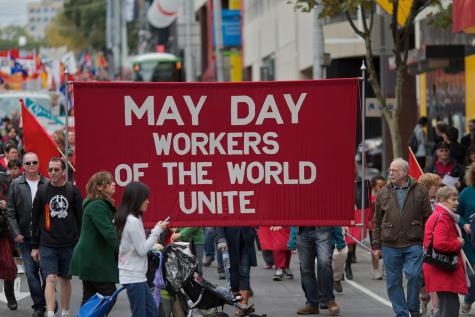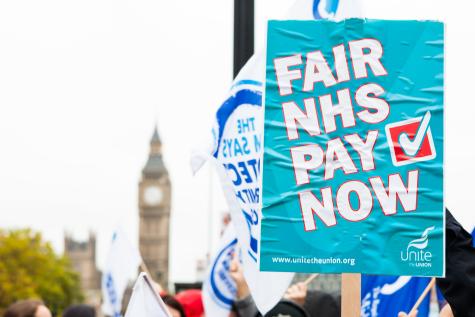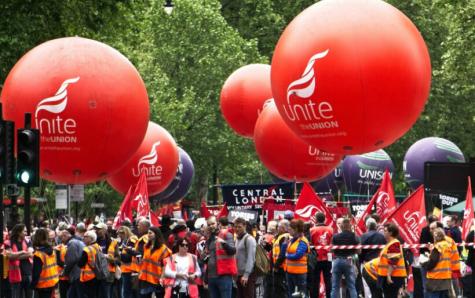International Workers' Day - May 1st

➡️ International Workers' Day, May 1st - Labour Day
Workers' Day, also known as Labour Day or May Day, commemorates the labour movement's struggles and achievements, particularly the fight for an eight-hour workday.
The date became internationally recognised in 1886 when a peaceful rally in Chicago turned violent. The aftermath led to a wave of international protests and the cementing of May 1st as a day of solidarity for workers around the world.
Since then, the organised labour movement has transformed the world of work – reducing hours, improving conditions, and winning new rights for millions of working people.
Today, Workers' Day serves as a reminder of the ongoing struggles for fair labour practices and workers' rights all over the world. As many countries designate this day as an official holiday, workers often use this opportunity to organise strikes, demonstrations, and collective bargaining for better working conditions and pay.
Trade unions play an important role in advocating on behalf of workers. They will often use this day to bolster the labour movement by encouraging greater membership, celebrating their achievements, and reminding us that the fight for social and economic justice is not over.
“Workers of the world, unite. You have nothing to lose but your chains!” - Karl Marx
Discover comprehensive guides to the work of trade unions in the UK and the U.S. as well as social justice in general and related workplace issues. - Please share this Labour Day resource via Twitter, Facebook and Instagram!

What are Current Challenges Facing Workers?
The creation of the welfare state was one of the major successes of the labour movement in Western countries. It represented great progress in people's general quality of life including working conditions, health, life expectancy, and social security.
The growth of the trade union movement meant that new relations were made through market regulations, public ownership, and democratic control. Unions now represent a serious threat to capital interests.
Despite the successes of the labour movement, our profit driven society and ongoing class exploitation means that workers are still drawing the short straw. Modern labour issues include the gender pay gap, the glass ceiling, youth unemployment, the gig economy, the living wage deficit, exploitation of migrant workers, child labour, forced labour, and the use of sweat shops.
-
Globally, women still get paid 23% less than men, creating a lifetime of income inequality
-
In 2022, almost 1 in 4 young people were not in any form of education, employment or training
-
The majority of gig economy workers earn significantly less than the minimum wage
-
50 million people worldwide are trapped in modern slavery
-
85% of sweatshop workers are young women between the ages of 15 and 25
-
250 million children between 5 and 14 are forced to work in sweatshops for up to 16 hours per day
-
Covid-19 cost women globally $800 billion in lost income in one year
-
Top executives got a real-term 9% pay rise in 2022 while workers worldwide took a 3% pay cut
Rising inflation, cost of living crises, and the spiralling cost of food, rent, and house prices, has created a world which is simply unaffordable for the average person. The divide between the rich and poor and has never been more apparent.
The dire state of economic inequality was summarised in an Oxfam report which revealed that in the last 2 years, the richest 1% earned nearly twice as much wealth as the rest of the world put together.
The NHS strikes and rail strikes in the UK are evidence that workers are tired of low pay and poor working conditions. In recent years we have witnessed airline and air traffic control strikes across Europe, the French pension strike, and teachers and university strikes across the world. The U.S. has seen union resurgence of Starbucks and Amazon workers, as well as Hollywood writers strikes, and U.S. auto workers strikes.
Workers are demanding the right to minimum as well as maximum hours, to holiday leave and sick pay, maternity and paternity pay, a living wage that reflects the state of inflation and the housing market, healthcare benefits, and job security.
The number of workers on strike in 2023 tripled when compared with the previous year. Unions have become more powerful, are seeing greater levels of success, and this is further emboldening others to voice their frustrations. Despite membership numbers still being relatively low and the introduction of anti-strike laws by governments, trade unionism is experiencing a revival few thought possible.

Workers’ Day for a Better World
The biggest strike in world history came in 2012 when 250 million Indian workers from banking, transport, retail, public services, construction, and industry blocked highways and railroads for 24 hours.
The workers were protesting Prime Minister Modi’s anti-worker legislation, privatisation plans, high levels of unemployment, spiralling inflation, and low pay. The strikes gained massive international support and showed the world the power of collective action.
We must fight the assault on workers' rights, support unions, and resist attempts by governments to strip our right to protest and strike. The working class throughout the world together can defeat the grips of capitalism and globalisation.
This Workers Day, many organisations are taking the opportunity to call on workers to unite in support of Palestinian rights and an end to the war in Gaza. Our collective voice is the strongest bargaining chip we hold against global powers and greed.
“The working class deserves respect, fair wages, and the opportunity to thrive.” – Bernie Sanders
Author: Rachael Mellor, 28.04.24 licensed under CC BY-ND 4.0
For further reading on International Workers’ Day see below ⬇️
- International May Day75738
- Haymarket affair - Wikipedia 343471
- Haymarket Martyrs' Monument - Wikipedia 343482
- #WorkersDay2024409550
- #MayDay2024409271
- #IWMD24409713
- #WorkersUnite409710
- #LaborDay2024409272
- #labourday2024409709
- #LaborRights409711
- #MayDay4Palestine409549
- #Strike4Palestine409715
- #MaydayForPalestine409712
- #ForDemocracy409714
- #MayDay2023343464
- #LaborDay2023343465
- #WorldOfWork343463
- #InternationalWorkersDay284232
- #MayDay284233
- #LabourDay284234
- Workers World408699
- TUC408694
- Oxfam408704
- London May Day408703
- YouTube75742
- Google News75737
- August Spies - Wikipedia 290818
- Louis Lingg - Wikipedia 343480
- Adolph Fischer - Wikipedia 343481
- Samuel Fielden - Wikipedia 343477
- Oscar Neebe - Wikipedia 343478
- George Engel - Wikipedia 343479
- Michael Schwab - Wikipedia 343476
- International Workers' Day (May 1) - Wikipedia75739
- May Day - Wikipedia75741
- Eight-hour day - Wikipedia284237
- International May Day Online Rally - WSWS 04.05.24 3:00pm US EDT 408928
- The Haymarket Martyrs and the origins of May Day - WSWS 07.05.24412369
- “Workers Have Power”: Thousands Rally in NYC for May Day, Call for Solidarity with Palestine - DN! 02.05.24410317
- Workers rule the streets on May Day - AP 02.05.24410326
- May Day: Rallies around the world in pictures - BBC 02.05.24410323
- Turkey: Hundreds detained at May Day rallies in Istanbul - DW 02.05.24410324
- Photos: May Day rallies across Asia demand improved labour rights - Al Jazeera 01.05.24410329
- Video: Police clash with protesters across Paris who threw petrol bombs in violent Labour Day march - Guardian 01.05.24410331
- Workers and activists around the world hold May Day rallies urging greater rights and more pay - Kurdistan24 01.05.24410332
- At least 108 police injured and 291 held in May Day protests in cities across France - Guardian 01.05.24410330
- Turkey police arrest 210 at Istanbul May Day protests - Al Jazeera 01.05.24410327
- May Day protests mark turbulent times - PBS 01.05.24410328
- Scenes from May Day: Protests, marches and rallies around the world - Reuters 01.05.24410325
- Belt Magazine, “May Day is a Rust Belt Holiday” - Anarchist Agency 29.04.24409707
- May Day Statement 2024 - AF 29.04.24409708
- Stop the War on Gaza — Fight Poverty, Militarism and Reaction - International Socialist 29.04.24409704
- European Communist Action: Long live the 1st of May — Long live socialism! - In Defence of Communism 29.04.24409703
- 200,000 on streets of London for 12th national demo for Palestine - Socialist Worker 27.04.24409706
- May Day 2024: Build a socialist movement of workers and youth to stop World War III, fascism and dictatorship! - WSWS 26.04.24408929
- Mass democratic workers’ struggle to end war and oppression - Soclialist Party UK 24.04.24409705
- MENA: May Day rallies and protests likely in countries across Middle East and North Africa region May 1-4 - Crisis24 23.04.24408701
- What to do on International Workers’ Day - The Berliner 23.04.24408695
- On International Workers’ Day: Urgent appeal from the Palestinian General Federation of Trade Unions - Workers World 13.04.24408696
- 6 Ideas To Celebrate International Workers’ Day 2024 - Team Bonding, 2024408702
- May Day: Seplat congratulates Nigerian workers - Punch 01.05.23343461
- Labour Day protests, strikes take over France, Italy, Netherlands - Al Jazeera 01.05.23343388
- Labour Day: A look into the history of honouring workers and labour rights - Euro News 01.05.23408698
- Workers and labour activists around the world rally to mark May Day - The Globe And Mail 01.05.23343460
- Iran Regime Arrests Tens Of Labor Activists Ahead Of May Day - Iran International 01.05.23343458
- Dutch labour union workers strike to force union to better deal - Reuters 01.05.23343456
- With one million people expected to hit the streets, France braces for 'historic' May Day rallies - Euronews 01.05.23343462
- May Day in France: A flash point of unrest - Politico 01.05.23343457
- May Day: World’s workers rally, France sees pension anger - AP News 01.05.23343453
- May Day marked by police crackdown in Istanbul's Taksim Square - Gerçek News 01.05.23343459
- Photos: May Day rallies across the world - Al Jazeera 01.05.23408700
- Tweet: This May Day, trade unionists here and around the world, have one message. ‘We aren’t going to take this anymore’. - @The_TUC 01.05.23343469
- Photos: May Day rallies across the world - Al Jazeera 01.05.23343454
- Tweet: In celebration of International Workers' Day, here's a quick thread of #MayDay posters from around the world. - @jacobin 01.05.23343467
- Tweet: Massive response from Lahore for our May Day rally - & this was at the start. Rally gaining even more momentum now. - @ImranKhanPTI 01.05.23343468
- Italy approves May Day labour package amid union criticism - Reuters 30.04.23343455
- Statement by Commissioner Nicolas Schmit ahead of International Workers' Day - European Commission 28.04.23343466
- International May Day 2022 Online Rally - Sunday May 1 3PM US Eastern Time284239
- May Day Marches Highlight Essential Immigrant Labor and Rising Frustration With Biden - Mother Jones 01.05.22287333
- Workers Mark May Day With Pro-Labor Protests Worldwide - Common Dreams 01.05.22285020
- Photos: Countries worldwide mark International Labour Day - Al Jazeera 01.05.22284942
- On International Workers’ Day, We’re Still Fighting for the Eight-Hour Day - Jacobin 01.05.22284957
- What is May Day? For the most part, the opposite of capitalism - NPR 01.05.23408707
- Eugene Debs’s May Day Address to Black Workers - Jacobin 01.05.22284960
- On International Workers’ Day, We’re Still Fighting for the Eight-Hour Day - Jacobin 01.05.22408705
- Ecuador: Movements and organisations take to the streets on May 1 - Pressenza 01.05.22284963
- Cuba cancels workers’ day parade as severe oil shortages bite - The Guardian 30.04.23343451
- What is May Day? For the most part, the opposite of capitalism - NPR 30.04.22284991
- The Strike Is Workers’ Sharpest Tool. A Resurgent Labor Movement Must Be Willing to Use It - Jacobin 29.04.22284958
- “The Wobblies”: Iconic Film on the Industrial Workers of the World (IWW) Is Rereleased for May Day - Democracy Now! 29.04.22284661
- On May 1, End Violence and Harassment at Work - HRW 29.04.22284653
- Iran’s Government Should Respect—Not Crush—Workers’ Rights - Iran HR 29.04.22284660
- May 1: What to do on (and around) International Workers Day 2022 - ExBerliner 28.04.22284658
- Labor Day in China honors more than just 'labor' - PR Newswire 28.04.22284659
- Workers of the World Unite! May Day Celebrates Working-Class Solidarity - Flagpole 28.04.22284662
- The Challenge of May Day 2022: For the International Unity of the Working Class against Capitalism, National Chauvinism and War! - WSWS 18.04.22284240
- Tweet: May 4 1886 - A bomb explodes during a rally in Haymarket Square, Chicago USA. Four anarchists are hanged for the crime, though they didn't throw the bomb. This event i…343470
- Have we fulfilled the promise of International Workers’ Day? - WEF 30.04.21408706
- Taking inspiration from International Workers Day - Greenpeace 30.04.21243686
- International Workers' Day 2021 - ITF Global 29.04.21284657